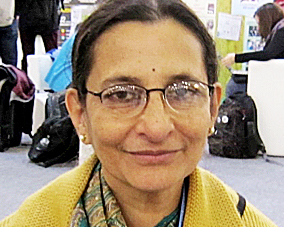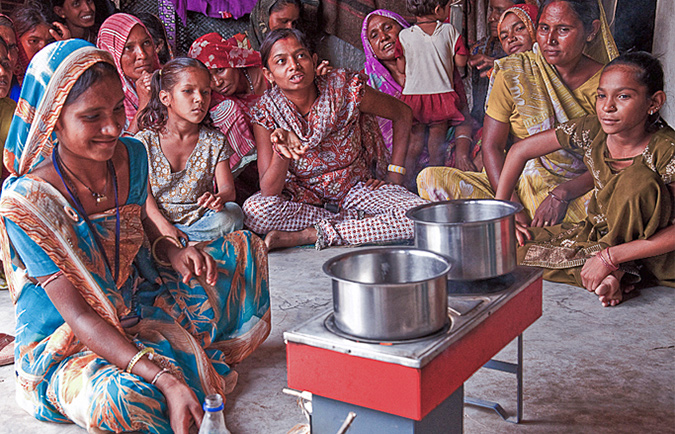For Indian activist, protecting women’s rights and the environment go hand-in-hand
Date:
Author: Sarah Hurtes

Usha Nair represents the All India Women’s Conference and the Women and Gender Constituency, a network of organizations working to ensure women’s rights within the climate change convention framework. She attended the international climate conference in December in Paris, where 195 countries adopted a landmark agreement to limit global warming.
What can India do to raise awareness on gender and climate change at the grass-roots level?
Our organization has been doing advocacy on climate change policies in India for the past 3-4 years. We generate awareness about climate change itself, and about government policies on climate change. Our members are all grass-roots women, many of whom are not highly educated. We discuss climate change with them and, drawing from their own experiences, how they can best adapt to these changes. We discuss these issues in all India’s communities and villages, not in very scientific terms, but in terms of the families’ very own actions. We ask everyone to come up with suggestions on what they can do to combat these changes.

Can you give me an example of this?
One of our branches in Kerala partnered with the state government to hold workshops to raise awareness on energy efficiency and alternative energy in each of the 14 districts. The workshops were so successful that the participants demanded more. So we trained volunteers in all the districts to spread these ideas. The volunteers visit each household regularly and talk to each member, especially the women, and explain the importance of using less electricity and the use of alternative energy such as solar energy. Each volunteer is expected to visit 1,000 households each year. And the volunteer must assess the impact of these visits. So during the first visit, the volunteer notes details such as the electricity or fuel bills, and during the next visit, looks at the bills again to see if any reductions were made. Families are also given the option of taking up dealerships for small solar energy appliances. Besides, for each visit the government gives the volunteer a small income. So this also generates income for these women volunteers.
... Energy is one very important .. all over India .. started by.. smokeless cook-stoves, which are very efficient and take less fuel.
Why is raising awareness on energy efficiency and alternative energy important for India?
Energy is one very important area where you can work for mitigation all over India, especially at the grass-roots level. We have been working on energy efficiency for over three decades. We started by propagating smokeless cook-stoves, which are very efficient and take less fuel. We trained 2-3 women in many Indian villages to promote these stoves from household to household. These women were paid, so again, it was an income-generating activity. India has little access to alternative fuels, so we should focus on reducing the use of fossil fuels by increasing energy efficiency. Additionally, we have been promoting biogas as an alternate fuel for kitchens, and promoting low-carbon technologies.
What are other areas that call for urgent action in India?
We want to organize workshops across the country and invite indigenous women from different regions so that we can learn traditional knowledge or wisdom from them. A publication will hopefully result from this, incorporating all that knowledge, especially on climate change, mitigation, and adaptation. Additionally, we want to organize programmes across the country to explain the Paris agreement to women, and then map out a plan of implementation.
What can intergovernmental agencies such as UN Women bring to the table on tackling climate change and gender inequality?
First, we are all volunteers and not highly academic, so we ourselves need to better understand the intricacies of the Paris agreement. We need organizations like UN Women to tell us in very clear terms how it is going to affect us at the grass-roots level and beyond. We can then pass this knowledge on at the local level. Secondly, we need assistance in looking for low-cost alternative energy technologies that we can use as examples in our work. Agencies like UN Women can help us connect with individuals working on similar projects in other countries.
Are you hopeful that the Paris conference will bring about concrete change?
I am very optimistic. Our organization issued a list of 11 demands for just action from world leaders in Paris, and many countries supported us. Even though we agree that gender should not be the top priority at the expense of other priorities, gender cuts across all the issues. Although gender may not be stated clearly enough in the final agreement, what matters most is the implementation, especially at the grass-roots level.
For more information
Please contact: Rineeta Naik
Communications Analyst, UN Women India
Tel: +91-11-4045 2327 E-mail: [ Click to reveal ]